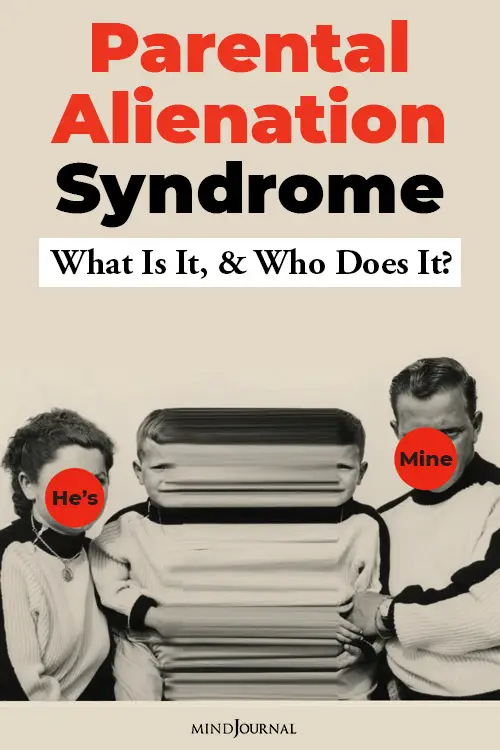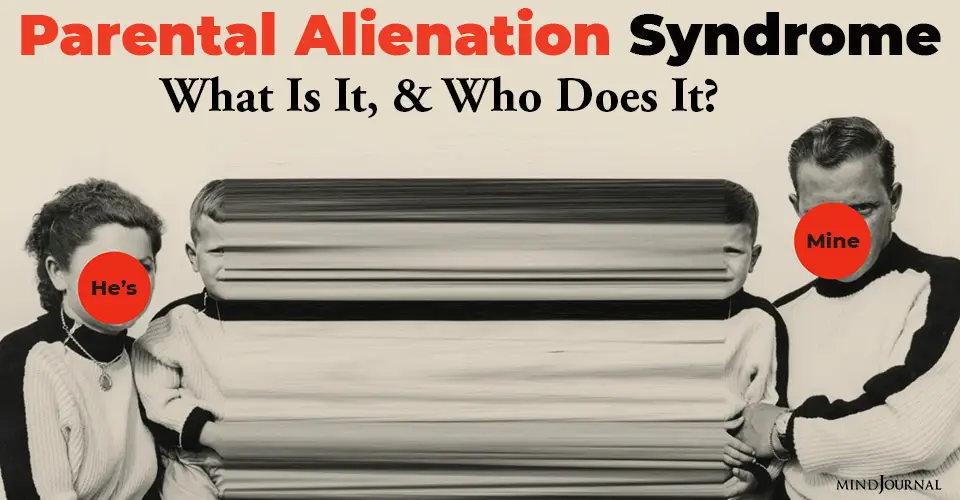Parental alienation syndrome is one of those things that is plaguing so many relationships today and is not just threatening to psychologically damage the parents who are on the receiving end of it, but also the children who get caught in the crossfire.
Recently, in my clinical practice, I’ve seen a huge uptick in cases of parental alienation. Instead of talking cooperatively in the manner, I teach in my book The Power of Two, these spouses and ex-spouses are interacting as adversaries. Worse, they’ve developed an exaggeratedly negative view, more fiction than reality, of the other partner.
So what is parental alienation (sometimes referred to as parental alienation syndrome)? And who does it?
Parental Alienation Syndrome
Parental alienation syndrome, a term coined in the 1980s by child psychiatrist Dr. Richard A. Gardner, occurs when one parent attempts to turn the couple’s children against the other parent. A parent who is angry at the spouse or ex-spouse accomplishes this estrangement by painting a negative picture of the other parent via deprecating comments, blame, and false accusations shared with the children. They may also “hoard” the kids, doing all they can to thwart the other parent from spending time with them.
In my clinical practice, the alienating parent has most often been a mother who is turning the children against their dad. At the same time, I have also had multiple families in which Dad is the alienating parent, turning the children against their mother.
In general, the alienating parent is the least emotionally healthy of the two; they’re often more wealthy, as well, and are better able to afford legal challenges.
Related: 50 Ways to Tell If Your Partner Is A Narcissist
The sad reality is that parents who damage their children’s natural affection for the other parent are doing serious—and even abusive—damage. PT blogger Edward Kruk, Ph.D., also writes about parental alienation. In one of his posts, he shares this important piece of research:
A survey taken at the Association of Family and Conciliation Courts’ annual (2014) conference reported 98 percent agreement “in support of the basic tenet of parental alienation: children can be manipulated by one parent to reject the other parent who does not deserve to be rejected.”
For the child, the biopsychosocial-spiritual effects of parental alienation are devastating. For both the alienated parent and child, the removal and denial of contact in the absence of neglect or abuse constitute cruel and unusual treatment. As a form of child maltreatment, parental alienation is a serious child protection matter as it undermines a basic principle of social justice for children: the right to know and be cared for by both of one’s parents.
Who Does Parental Alienation?
An alienating parent often shows either narcissistic or borderline tendencies.
Narcissistic individuals tend to be self-absorbed, and most centrally, they show deficits in their ability to listen to others’ differing perspectives. Instead, they hyper-focus on what they themselves want, think, feel, and believe—without taking others’ desires and ideas into consideration.
An alienating parent who is higher in narcissism may aim to use the children as weapons or pawns in his/her battle to “destroy” the other parent. These individuals often claim to be protecting the children against the “evil” other. However, by using the children in their perpetual fight to hurt the other parent, they often show little consideration for what is in the best interests of the child.
Typically, kids benefit from the presence of both parents. They do not benefit—and indeed can be harmed—when one of their parents portrays the other in a relentlessly negative light. Similarly, they are often harmed by parents who fight their way through divorce and post-divorce. They are harmed when parents put them in the middle of their power battles. They are harmed when a parent uses them to accomplish their own angry agenda, ignoring the needs of the children.
The central element in borderline personality disorder, on the other hand, is emotional hyper-reactivity. These excessively intense emotions often get expressed as anger.
In addition to getting emotionally aroused too often, and too intensely, people with this disorder often have difficulty self-soothing. As a result, their distress tends to be longer-lasting than the distress that most people experience.
In this regard, they have deficits in emotional resilience, or the ability to recover after feeling frustrated or disappointed. They may become at risk, therefore, for developing a victim self-image, blaming others for whatever goes wrong—which, in turn, may enable them to victimize others: “I’m a victim; therefore, I have a right to victimize you.”
Related: 19 Signs You Were Raised By a Narcissistic Mother or Father
Some elements of borderline disorders may become evident in the way that certain alienating parents twist reality. When these individuals are higher in borderline tendencies, they often offer exaggerated accusations against the other parent—accusations that may, in fact, be projections of their own negative attributes (calling the other parent “selfish,” for instance, when they themselves actually demonstrate more selfish behavior).
Some alienating parents may also engage in another quintessential borderline pattern, a habit that therapists refer to as splitting. This occurs when the alienating parent enlists others to join their side in fighting against the supposedly “evil” other, splitting the family into us against them.
Individuals with borderline personality features may become mad when someone of import to them won’t give them what they want—e.g., a spouse who has decided to leave the marriage, perhaps because the alienating partner was not capable of forming a healthy, loving, and collaborative partnership.
Their goal, then, becomes the destruction of the other parent’s relationship with the children. They may encourage their children to join them in this battle. They do all they can to deprive the other parent—their enemy—of the ability to continue being a parent.
Lastly, those who engage in severe alienation often also have habits similar to those present in antisocial personality disorder. That is, they lie and are good at it. They also carry out actions that harm others, including their child, without feeling guilt.
What Drives Parental Alienation Behaviors?
Usually, the alienator’s motive is to “get back” at their spouse, who they may see as having hurt them by divorcing them—even if, in fact, the alienator was the one who initiated the divorce. Another motive can be jealousy, especially when the ex-spouse remarries.
Some alienators seek to extort money from their ex. If the child lives primarily with them, they may hope that the ex can be compelled to provide additional child support. Other alienators, and especially those who start alienating the child early on, during the marriage, may be motivated by the desire to have the child for themselves alone.
There’s no doubt other motives as well, but these seem to be the primary ones.
Related: 9 Tips For Co-Parenting With Your Difficult Ex
In Sum
If you’ve been feeling perpetually angry at your spouse or ex-spouse, anxious about your co-parenting relationship, or depressed about the situation, it may be time to take action—both for your sake and for your children’s. As a first step, learn where you can get more information about parental alienation.
Virtually no parent wants to sit passively, locked up in distress, while the other parent causes major psychological damage to their offspring. If you are struggling with a situation of parental alienation, change is possible. Go for it—starting today.
For further and more detailed information about parental alienation, written with a focus on what therapists need to know to recognize, diagnose, and treat alienation, please see this article. In addition, please feel welcome to check out here the dozen or so additional articles on alienation have which I posted on this website, as well as key articles by others about the problem.
Lastly, check here for information about ways to manage the inevitable negative emotions triggered by alienation.
Susan Heitler, PhD author of Prescriptions Without Pills: For Relief from Depression, Anger, Anxiety and More
For more resources on the topic of alienation, see https://www.therapyhelp.com/parental-alienation-assessment-treatment/
Written By Susan Heitler Originally Appeared In Psychology Today
Going through something like parental alienation syndrome is extremely tough, but if you want, you can change that situation. If you are struggling with this, and you want your child to not get psychologically affected by this toxic behavior, then take some steps today to change the situation.









Leave a Reply
You must be logged in to post a comment.